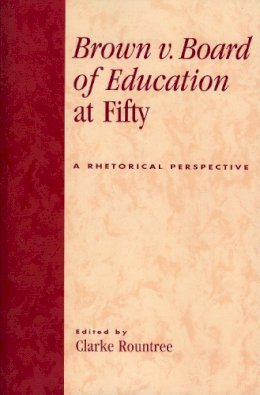
Stock image for illustration purposes only - book cover, edition or condition may vary.
Brown v. Board of Education at Fifty: A Rhetorical Retrospective
Clarke . Ed(S): Rountree
€ 61.84
FREE Delivery in Ireland
Description for Brown v. Board of Education at Fifty: A Rhetorical Retrospective
paperback. Examines the role rhetorical theory played in the development of educational segregation. This book considers the NAACPs development of a series of graduate school cases to challenge Plessy, analyzes the Brown decision itself, assesses the state response to Brown, and critiques the two Supreme Court decisions implementing the Brown decision. Editor(s): Rountree, Clarke. Num Pages: 220 pages, black & white illustrations. BIC Classification: 1KBB; HBJK; HBLW; JNK; LNT. Category: (UU) Undergraduate. Dimension: 228 x 167 x 18. Weight in Grams: 322.
The story of Brown v. Board of Education is a half-century old now and has been retold many times by historians, legal scholars, sociologists, and others. This collection of persuasive scholarly essays examines, for the first time, the role rhetorical theory played in the development of educational segregation. Contributors consider the NAACP’s development of a series of graduate school cases to challenge Plessy, analyze the Brown decision itself, assess the state response to Brown, and critique the two Supreme Court decisions implementing the Brown decision. By illustrating how rhetorical strategies created, sustained, challenged, and, ultimately, reversed educational segregation in the United States, this work demonstrates the real value of the rhetorical perspective and provides encouragement to those who wish to help further develop this emerging field of judicial rhetoric.
Product Details
Format
Paperback
Publication date
2005
Publisher
Lexington Books United States
Number of pages
220
Condition
New
Number of Pages
220
Place of Publication
Lanham, MD, United States
ISBN
9780739114599
SKU
V9780739114599
Shipping Time
Usually ships in 15 to 20 working days
Ref
99-2
About Clarke . Ed(S): Rountree
Clarke Rountree is Department Chair of Communication Arts at the University of Alabama in Huntsville.
Reviews for Brown v. Board of Education at Fifty: A Rhetorical Retrospective
The chapters complement each other and provide additional insight when read together. By illustrating how rhetorical strategies created, sustained, challenged, and, ultimately, reversed educational segregation in the United States, the collection demonstrates the real value of the rhetorical perspective.
Race Relations Abstracts, November 2007
Predating the filing of the litigation constituting the seminal and precedental lawsuits leading to Brown v. Board of Education were decades of restless and uncompromising agitation for change. This agitation emanated from platforms and pulpits; newspaper editorials and journals—on behalf of the rights of blacks. Targeted were the precepts of white superiority and black inferiority that the Supreme Court, through its decisions, had embedded in America's institutions. Brown v. Board of Education was the ultimate triumph that placed the rights of blacks before the law, on equal footing with whites. The 'Rhetorical Perspectives' provided by this powerful collection of essays describe the pathway that led to the transforming decision of Brown.
Nathaniel R. Jones, Blank Rome LLP
Race Relations Abstracts, November 2007
Predating the filing of the litigation constituting the seminal and precedental lawsuits leading to Brown v. Board of Education were decades of restless and uncompromising agitation for change. This agitation emanated from platforms and pulpits; newspaper editorials and journals—on behalf of the rights of blacks. Targeted were the precepts of white superiority and black inferiority that the Supreme Court, through its decisions, had embedded in America's institutions. Brown v. Board of Education was the ultimate triumph that placed the rights of blacks before the law, on equal footing with whites. The 'Rhetorical Perspectives' provided by this powerful collection of essays describe the pathway that led to the transforming decision of Brown.
Nathaniel R. Jones, Blank Rome LLP
